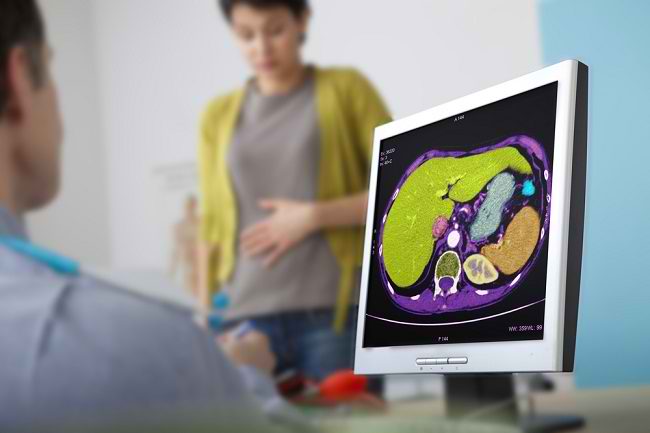Abnormalities in the liver are conditions when the liver or liver has problems and cannot function properly. Abnormalities in the liver that are not treated can cause various disorders in the body. This condition can appear suddenly, but it can also happen slowly and gradually.
The liver is an important organ that has many functions for the body. If there is an abnormality or disturbance in the liver, the performance and various functions of other organs and tissues of the body will be disturbed.

This is because the liver has many functions and plays a role in many things, including:
- Processing cholesterol, blood sugar, and bilirubin
- Neutralizes toxic substances, such as ammonia and alcohol
- Produce albumin protein
- Regulates the process of clotting or blood clotting when an injury occurs
- Stores iron and recycles damaged red blood cells
- Produces bile to aid digestion
- Produce substances that form immune reactions to fight infection
Abnormalities in the Heart Based on Time
Based on the length of time it takes for liver damage to occur, liver disorders can be classified into 2 types, namely:
Acute liver failure
Acute liver disease occurs suddenly and can progress without any initial or accompanying symptoms. People with acute liver disease can experience liver failure in a matter of weeks or even days.
Generally, this condition is caused by viral infections such as hepatitis A and hepatitis B, poisoning, autoimmune diseases, or taking too many drugs and certain herbal supplements that trigger drug overdoses.
Chronic liver failure
Liver disorders that are chronic in nature occur more slowly and take months or even years before they finally cause symptoms of liver dysfunction.
This condition is usually caused by long-term alcohol consumption, cirrhosis, liver cancer, fatty liver, and chronic hepatitis.
Some Causes of Abnormalities in the Liver
There are several diseases or medical conditions that can cause abnormalities in the liver, namely:
1. Alcohol consumption
The habit of consuming excessive alcohol for years can cause the liver to become inflamed and damaged and over time, the liver will experience permanent damage. This permanent damage is called cirrhosis.
2. Fatty liver
Fatty liver is a liver disease caused by the accumulation of excess fat or cholesterol in the liver cells. This condition usually affects people who are overweight or obese, diabetes, and metabolic syndrome.
However, it is possible that people who consume too much alcohol also suffer from this condition.
3. Hepatitis
Hepatitis is a condition when there is inflammation of the liver caused by a viral infection, excessive or long-term alcohol consumption, as well as an overdose of drugs or the side effects of certain medications.
4. Hemachromatosis
Hemochromatosis is an inherited disorder when there is a gradual buildup of iron in the body, especially around the liver. This excessive accumulation of iron can then cause abnormalities in the liver.
5. Primary biliary cirrhosis
Primary biliary cirrhosis is a type of liver disease that occurs in the long term and is rare. This disease damages the bile ducts in the liver and disrupts the flow of bile.
6. Liver cancer
Liver cancer is a dangerous disease that occurs in the liver. Liver cancer often occurs in people with chronic liver disorders such as cirrhosis, hepatitis B, or hepatitis C, as well as people who are addicted to alcohol in the long term.
In addition to some of the diseases above, abnormalities in the liver can also be caused by other things, such as food or chemical poisoning, autoimmune disorders, blood infections or sepsis, and Wilson's disease.
Symptoms of Liver Disorders You Need to Watch Out for
Not all people with liver disorders show the same symptoms, some even show no symptoms at all, especially if the condition is only in its early stages. This often makes abnormalities in the liver only detected at an advanced stage.
However, there are some signs and symptoms that need to be suspected as signs and symptoms of liver disorders, namely:
- Digestive disorders, such as nausea, vomiting, and diarrhea
- Abdominal pain, especially in the upper right abdomen
- Decreased appetite
- Often feel tired
- Jaundice or jaundice
- Easy bruising or bleeding
- Weight loss
- Itchy rash
- Swelling in various parts of the body, such as the abdominal cavity (ascites), legs, and face
If it is severe, abnormalities in the liver can cause kidney failure and abnormalities in the brain, causing symptoms of seizures, changes in mental status in the form of confusion or noise and restlessness, to coma.
Risk Factors for Liver Disorders You Need to Know
There are several factors that can increase the risk of abnormalities in the liver, namely:
- The habit of consuming alcoholic beverages in excess
- Drug use, especially drugs in the form of injections
- Unsterile tattoos and piercings
- Exposure to other people's blood and body fluids, for example through blood transfusions or sharing needles with others
- Having sex without a condom
- Exposure to certain chemicals or toxins
- History of diabetes, obesity, and metabolic syndrome
In order to prevent abnormalities in the liver, you need to stay away from some of the risk factors above by living a healthy lifestyle.
You can do this by not smoking and consuming alcoholic beverages in excess, maintaining an ideal body weight, undergoing safe and healthy sexual behavior, as well as having regular health checks or check-up see a doctor to monitor the condition of your liver health.
If there is an abnormality in the liver, you need to get treatment immediately by a doctor. This is important so that the damage to the liver does not get worse and develops into a permanent liver disorder that can cause dangerous complications.
Therefore, if you experience symptoms of abnormalities in the liver, immediately consult a doctor to get the right treatment before complications or permanent damage occur.









